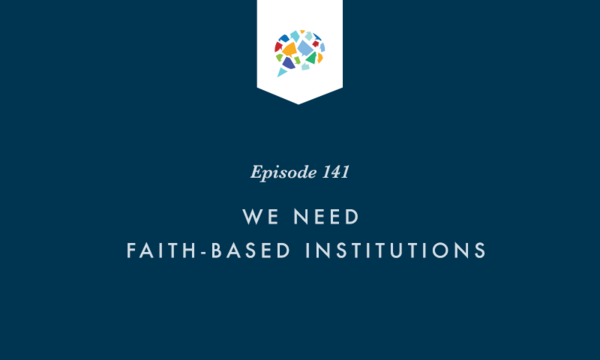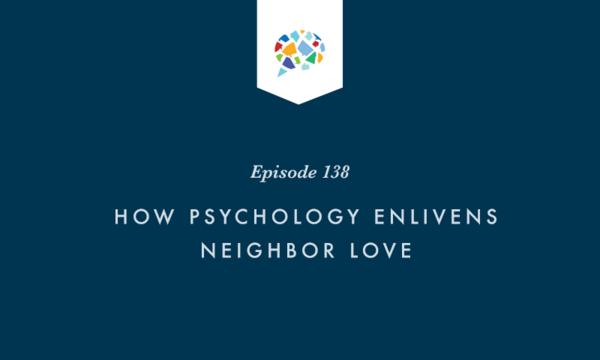
You’re enjoying some festive fare and then it happens: you hear an offensive comment or a family member says something disagreeable and your emotional heat begins to boil. What do you do? How do you respond? Is there anything you can do preemptively to help yourself and the situation in that moment? On this episode, Tim and Rick discuss spiritual discipline exercises you can do to prepare for hard conversations with family and friends during the holidays.
Transcript
Rick Langer: Welcome to the Winsome Conviction Podcast. My name's Rick Langer, and I'm one of your co-hosts here. I'm a professor at Biola University and also the co-director of the Winsome Conviction Podcast with my good friend, Tim.
Tim Muehlhoff: Hey, it's great to be here. We're talking about holidays, we're talking about sometimes conversations can go sideways and holidays are a pretty good environment for that to happen. So in the previous podcast, you don't necessarily need to go listen to it, but we talked about communication strategies, came up with some ideas, but we want to talk about in this podcast what we have learned in the two and a half years that we've been doing the Winsome Conviction Project. And that is, it really comes down to spiritual preparation, that these hard conversations are hard for a reason, and God expects us to respond in a way that's distinctly Christian.
Rick, listen to this passage, 1 Peter 3:9, the New Living Translation. "Don't retaliate with insults when people insult you, instead pay them back with a blessing. That is what God has called you to do." Boy, that's a good word that's really hard. And if we're really going to pull that off come the holidays, give a blessing for an insult, we better spiritually prepare to be in that kind of attitude and that kind of spiritual space as we can't, don't know how our relatives are going to phrase something and they might do it in a really harsh, inappropriate way, but that doesn't give us the freedom to respond in kind.
Rick Langer: And I would probably add to that it isn't just a question of spiritual preparation for a conversation. This is really just an issue of general spiritual formation. And to say, yeah, I need to have a well-formed soul because basically conversations and interactions are simply places where my soul is revealed. So if I don't tend it, well what comes out is going to be what I have cultivated.
So that's one of the tasks that comes to my mind. One of the things... Let me just start with something that comes to my mind when I think about this in terms of the spiritual kind of general formation, not just conversational issues, but the need for me and my soul... Let me put it this way, to make God big again. I think our controversies and our divisions and all these things have a way of becoming just enormous in our sight. They become the only thing that we can see and to say, you know what, I need to just give myself a big reminder that when all is said and done, almost everything I'm wound up about will have come and gone. And Jesus will still be there. God will still be there. Psalm 46 has this wonderful image, "God is our refuge and strength, a very present help and trouble. And therefore we won't fear when the earth gives way. The mountains are moved into the sea, the waters roar, and the mountains tremble and it's swelling."
And that song concludes with its phrase "Be still and know that I am God." And so that's that image of, yeah, let me cultivate a discipline of making God large again to my soul in my perspective.
Tim Muehlhoff: That's really good. Made me think of what Timothy is told by Paul in 1 Timothy 3:7, "Train yourself for godliness." That's so interesting to me, Rick, is sometimes I think we over-spiritualize spirituality. Like, God just hit me with a brand new attitude, perspective and patience come Christmas Eve. And Paul saying, no, you needed to be training before that happens. I went to a Kung Fu school, and he was a bad businessman, he was a really good teacher. He's a bad businessman. People would come in and he'd say, "Can you at least come three times a week?" Oh, probably not. He goes, "Oh, then don't join my school. You're going to be frustrated. You can't do Kung Fu coming once a week or twice a week." I kind of think Paul would say that to us is, listen, you work at the spiritual disciplines to get to this moment where you can overlook an insult and give a blessing instead. So it's like this American attitude about weight loss. I want to lose-
Rick Langer: Give me a pill.
Tim Muehlhoff: Or I want to lose five pounds this weekend. What are going to do? Cut off an arm? What are you going to do? But we have to discipline ourselves. So the great thing about the holidays, and I love what you just said, Rick, this is a lifestyle, and the holidays just happen to come.
Rick Langer: It's the game. You've been training all season. Now it's the game.
Tim Muehlhoff: Yes. So we often ask churches, organizations that we work with, we've kind of created this five-day devotional that we ask people to go through before the Winsome Conviction project would come and work with people. We're currently shoring that up somewhat and eventually, we'll put that on our website. But I like that idea, Rick, of we need to take at least five days and kind of train to be ready for this moment. That's a pragmatic view. In some ways, I like yours much better is we're kind of training all the time what God asks us to do. And that will be shown in the hard conversations that we have with people. "Blessed are the peacemakers, they shall be called the children of God," I think is very important.
Rick Langer: Yeah. I think similar thing to making God big again for us is, let me put it this way, particularly apropos for the holidays, making God close to us again. So I think not only do our problems get big, but in the presence of the big problem, we tend to move away from God. And that Christmas is the Emmanuel season, "God with us" season. And it's the exact time that we kind of celebrate kind of the core of the Christian gospel is that the God who is far above us became near and close beside us. The transcendent became imminent. Jesus entered our world. And it would be really sad, I guess the image of him coming to all these different ins and not having a place to be born. I think we need to have that feeling of sense of "Am I being hospitable to Jesus in my life at this point?" Am I making room for him?
So not only do I want God to be big, but I want Jesus to be near, I want him to be part of my daily life. And that again, obviously that's the thing that's way bigger than conversations, but it manifests in conversations. When we don't feel the nearness of Jesus, we're more easily threatened. We're more anxious. We're more troubled by things. And it is far more prone to bring the worst out in us.
Tim Muehlhoff: We probably need to do a little bit of a diagnostic heading into the holidays of how we feel about people that are going to be around the Christmas table or the Thanksgiving table. I remember with theologian saying, here's a very quick way to do a diagnostic, how you feel about people. Pray a blessing for them.
Rick Langer: See how it goes.
Tim Muehlhoff: And see how it's-
Rick Langer: You know what I mean, I made it halfway through the sentence and then it shut down.
Tim Muehlhoff: Not for this person. I mean, if you were to make a list... Because I could already anticipate who's going to be at the celebrations that we'll be at. I almost can do the seating chart. It would be interesting to pray for each person around the chart where the first three, you're like, oh yeah, fourth person... Here's a prayer or blessing, Rick, "Almighty God, we entrust all who are dear to us to thy never failing care and love for this life and life to come knowing that thou art to doing for them better things than we can desire or pray." And I'm like, "Yeah, that person didn't deserve any of that." And I'm having a hard time praying that prayer, a blessing.
That's a good diagnostic to say, okay, there are some issues I have with this person. I need to be aware of that and I need to deal first in my heart. By the way, those issues might be legitimate. People do hurt each other and there are disappointments, a breach of trust. But it's good to know that even in spite of that, God is very generous towards us and our sins and in our struggles, are we exhibiting grace to another person? Are we withholding that grace? And thank goodness God doesn't withhold that grace from us. So maybe pray blessings for people and how easy it is to pray might give you just a little bit of a tip-off your relationship to that person.
Rick Langer: Just as you mentioned that, Tim, an idea came to my mind because you know how it is where you're often having conversations, again, be it a particular family meal, it could just be a Christmas party or things like that, but you suddenly bump into a person who you aren't the fondest with. It'd be an interesting thing to just stop and say, "Hey, I really want to be working on my prayer life for people. Is there something that could happen for you this year that would really be a blessing and a joy to you because I would really love to be able to pray that God would give you that sort of a blessing?" And it's an invitation for you and that person to talk about something you probably usually don't talk about. And it'd be a good opportunity.
Tim Muehlhoff: Yeah. Rick, I love that. It's all our attitude. So, the Harvard Negotiation Project, we've mentioned them before on this podcast. They said something once in one of their books. They said, "People keep in mind people's lives are much harder than what you think." So let me tell you this quick story, Rick. We travel a lot with the project as well as with Biola University. So I'm on this one plane and there's a young mom, and Rick, she has two kids that are... I mean it was-
Rick Langer: Not pretty.
Tim Muehlhoff: I was so angry. I had my Bose on and they didn't do anything. Noise-canceling didn't work. These kids were nonstop. And you could see people getting agitated and even the flight attendant a couple times tried to reel the kids in and the mom was just, she was done.
So I got to tell you, I was getting pretty judgmental. Then about with I'd say 50 minutes left in the flight, she breaks down crying. She loses it. She just cries. And she goes, "I'm so sorry." And she's just weeping, attitude changing in a second. People turning around saying, "No, oh, we got them."
Rick Langer: Interesting.
Tim Muehlhoff: "You good. We got them." "No, Hey, I've got some candy, can we?" Because we realized she wasn't callous to it. She was overwhelmed. And we've all had that experience. When the kids stop being human-
Rick Langer: What do you want me to do?
Tim Muehlhoff: What do you want me to do? So, I'll never forget the change and myself included, all of us. So to remember with that annoying family member, I need to remember life's probably twice as hard as what I think it is. And they're not being callous. So that empathy and projecting into what their struggles might be, I think is incredibly important. And let's keep that in mind when the holidays hit.
Rick Langer: Yeah. One final thought in terms of kind of spiritual formation exercises for doing this. One of the things we talk about a lot as Christians is kind of inverting the world's pattern, not being conformed to the world, but being transformed. Oftentimes that's kind of turning things upside down. That's a phrase used to describe questions of people who've turned the world upside down.
One of the patterns in the world today, the world around us at least seems to be that we're inclined to confess the sins of others. We trumpet everything that somebody did wrong. And I mean, Twitter and Facebook, social media in general is almost built around that kind of a process of "Let me confess the sins of others." And at the same time, we want to hide our ingroups failings or problems or things that are sincerely a problem with our ingroup. And I just thought that would be a quality we would hate to have in a friend. To have a friend who is always pointing out your problems and always trumpeting their own victories, that would get really tedious in a hurry.
And so it would be an interesting thing to say, "Let me invert that," and say, "Okay, let me just do a traditional Christian discipline of confessing my own sin and potentially confessing the sins of my own people, my own group." You see Daniel modeling many times in the Old Testament, you'll see prophets and leaders confessing the sins of their people, the people of God. And then to be able to say, let me also profess the goodness of others as a regular spiritual discipline. And there, I don't mean necessarily just to profess the goodness of our enemies because that's really hard. And that may not come to mind quickly, but I've discovered even professing the goodness of our friends, we don't often do enough.
Tim Muehlhoff: That's true.
Rick Langer: To say, let me just cultivate a discipline of acknowledging, identifying, and celebrating the goodness that I see around me. And let me intentionally, maybe every Sunday, just like once a week, I'll acknowledge a goodness of somebody who I think overall isn't really that good. But I disagree with her, even dislike. But I will just daily make an exercise to say, "Let me celebrate the good." Because we live in a culture that trumpets the bad, that condemns the bad. The hub of our culture's wheels seems to be the bad things and be great for us to say we're going to turn that around. We're going to be people who have a passion for cultivating, enhancing, developing, and celebrating the good things around us.
Tim Muehlhoff: And that's the psychological principle of priming. You can prime yourself to see the bad. You can prime yourself to see the good.
Rick Langer: Your choice.
Tim Muehlhoff: Yep. Let me close with this. Having done the Winsome Conviction project with you these last couple years, we believe in the spiritual battle. Nearly 20% of everything Jesus ever said had to do with spiritual battle. John goes so far as to say the whole world lies in the power of the evil one. So listen, if you are heading into the holiday season, we need to pray spiritual warfare prayers because Satan loves to disrupt unity. And if you are the one hosting it, then I think what Charles Kraft says is that you have status authority over what's about to happen in your house because you are the host. So use that power to pray warfare prayers, but also if you're the patriarch or the matriarch of the family, for sure you have status authority to pray for what's about to happen around the dinner table.
So, I would just encourage you to pray a warfare prayer, speak to demons out loud, and claim the authority of Jesus Christ. And as the patriarch, the matriarch of this family, demons, we are telling you, you are not to disrupt dinner. You are not to disrupt this time. And just to be bold in that. I think sometimes we're embarrassed to talk about spiritual battle, but boy, Rick, what we're seeing happening in culture isn't all spiritual battle. There's probably a lot more than what we're willing to acknowledge and we just need to take that seriously. That Saint wants to disrupt and destroy and we need to cut that off in the front end and use our authority given to us by Christ.
Rick Langer: Yeah, our battle language isn't always a metaphor.
Tim Muehlhoff: Yeah, exactly.
Rick Langer: It really a battle. Well, thanks for joining us. We appreciate having you. We trust that you'll have a great holiday season. We pray for your conversations during this time and even other times, as we mentioned throughout the year, the same principles really do apply. They just become a little more intense oftentimes when we're in the midst of all the things that go on in the holiday season.
Thanks for joining us. We encourage you to subscribe to our podcast and also check us out at the winsomeconviction.com website.
 Biola University
Biola University




